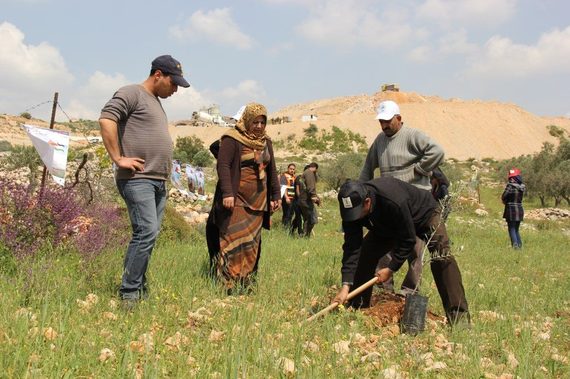The idea of "food sovereignty" emerges from and energizes an international movement, growing from the bottom up. Its members believe that all people have the right to produce the food they want, in the way they want, and in ways that feed their families and communities and bring them a fair return. Members of the food sovereignty movement also stand in solidarity against illegal land grabs - one of the main threats to creating food sovereignty and fulfilling the human right to food - in which governments and large corporations evict farmers from their land.
On Wednesday, October 15th, at 7 pm CT in Des Moines, IA, the 2014 Food Sovereignty Prize will be awarded to the Union of Agricultural Work Committees (UAWC) from Palestine and Community to Community Development of Bellingham, WA. Both of these organizations have worked to protect the rights of their members - Palestinian farmers and fishers and indigenous migrant farmworkers in the berry fields around Bellingham, WA - many of them without basic human rights and struggling to feed their families, often in the face of deportation, violence and land grabs.
The Food Sovereignty Prize was created in 2009 to raise the voices of grassroots leaders and movements and to share their stories and understand their reality. The idea, the movement, and the practice of food sovereignty show us that people on the frontlines of crisis - the almost 1 billion whose families are made so poor that they cannot eat - are the ones with the vision and authority to lead and develop the solutions for change.
You may be aware of another more famous food prize: the World Food Prize was created in 1987 by agri-foods companies and were joined in 2007 by Monsanto, which donated $5 million to the prize. Their contribution was rewarded last year, when Monsanto's own executive, Bob Fraley, won the prize in 2013 alongside the executive of another biotech company, Syngenta, as well as another biotech scientist.
Cesar Chavez once said in the midst of a grape boycott, "our struggle should not be about grapes; our struggle should be about people." The solutions to hunger that both of these prizes represent are widely divergent. The Food Sovereignty Prize starts with and focuses on people, the billions of small farmers who grow the majority of the world's food and who are desperately poor. It honors the leadership of farmers themselves, not the discoveries of scientists. It does not trumpet technical solutions imposed on farmers but celebrates the lifelong expertise of farmers and respects their needs and resources as the only way to build lasting solutions. The food sovereignty movement is truly about people, not new chemical or technical discoveries that produce agricultural commodities. And by focusing on people, and on their indigenous, passed-down knowledge about agriculture in their local ecological and cultural context, it is helping millions of people to learn a better method of farming called "agroecology" that produces healthy food for families, protects the environment, restores the soil, and builds community and culture.
If you can't make it to Des Moines to attend the Food Sovereignty Prize Ceremony in person, tune into the livestream at www.foodsovereigntyprize.org/live on Wednesday, October 15th at 7 pm CT!
